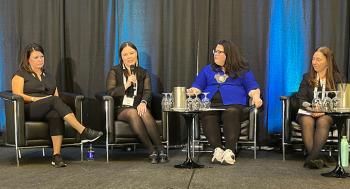Image Caption
Local Journalism Initiative Reporter
Windspeaker.com
On March 5, Saga Williams was featured on a panel discussion at the Prospectors & Developers Association of Canada (PDAC) conference held March 3 to March 6 in Toronto.
Williams, from the Curve Lake First Nation and owner/operator of AS Williams Consulting, works with the First Nations Major Project Coalition on membership outreach. She frequently advises on First Nations’ involvement in the critical mineral and energy sectors. She has worked alongside Indigenous communities on projects that exceed the $100-million cost mark.
As part of the panel “Decarbonization: New avenues for Indigenous participation” William said an innovative approach to protecting the environment is “creating an economic benefit for communities who want to protect green space where the decarbonization happens naturally.
“And we need to talk about those things in terms of what are the economic benefits for us in protecting areas and doing it in a way that we have oversight over that and that we are financially rewarded for that protection and that stewardship.
The panel took on a range of subjects. Jenny-Lou Campbell, a member of Serpent River First Nation in northern Ontario, is a fourth-generation member of her family to work in the mining industry. Campbell works as a mining policy analyst for Anishinabek Nation, which represents 39 First Nations in Ontario.
Campbell said she has seen a major shift in the sector in the last five to seven years.
“There’s more opportunities being presented to our (Indigenous) communities to have an active participation in the industry and bring greater value back into the communities themselves,” she said.
“It’s not just about the financial aspect of mining. You also have to look at the environmental and the cultural aspects of it as well, because those are our values and that is what is most important to me.”
Campbell said projects should not always be dependent on financial figures.
“It’s not always about the dollars,” she said. “Dollars are really important, I get that. But I think that what needs to be learned, if we are going to truly decarbonize our industry, is (environment and culture) needs to be brought further to the forefront and given equal playing grounds with the financial aspects.”
Campbell is also hoping to see an increase in Indigenous participation in the industry.
“What I’ve been hearing from our community members is, historically, we’ve been excluded from the mining industry,” she said.
“So, there’s some catch up that we need to play to further amplify our voices and our presence within the industry itself. And I think that we can do that by focusing on learning more about each other and our cultures and what we value.”
Campbell also believes it’s critical for non-Indigenous partners to realize that some Indigenous communities they are looking to join up with can be at a disadvantage.
“I think what is really important is recognizing the struggles that First Nations have right now with capacity, with core capacity, lack of administrative support, lack of technical IT infrastructure,” she said. “It’s all those simple things that I realize I took for granted working for industries and coming back to First Nations and seeing them.”
PDAC’s decarbonization panel also included Kimberly Lavoie, a Mi’kmaq woman who is the assistant deputy minister for Nòkwewashk, an Algonquin word meaning sweetgrass.
Nòkwewashk is the new name for Natural Resources Canada’s Indigenous Affairs and Reconciliation and Major Projects Management Sector.
“We are developing a curriculum for scientists so that scientists understand and can respect Indigenous traditional knowledge in a way that it hasn’t been recognized in the past,” Lavoie said. “And there’s a desire to learn, but (scientists) don’t have the knowledge, they don’t have the tools, they don’t have the information.”
Lavoie also said her department has developed a code of conduct for scientists.
“We’re pilot testing it now and we’re going to come back and make some refinements to it to see if we need to fix it,” she said.
The panel was moderated by Karen Restoule, a member of Dokis First Nation in northern Ontario, who is a vice-president with Crestview Strategy in Toronto.
Local Journalism Initiative Reporters are supported by a financial contribution made by the Government of Canada.

